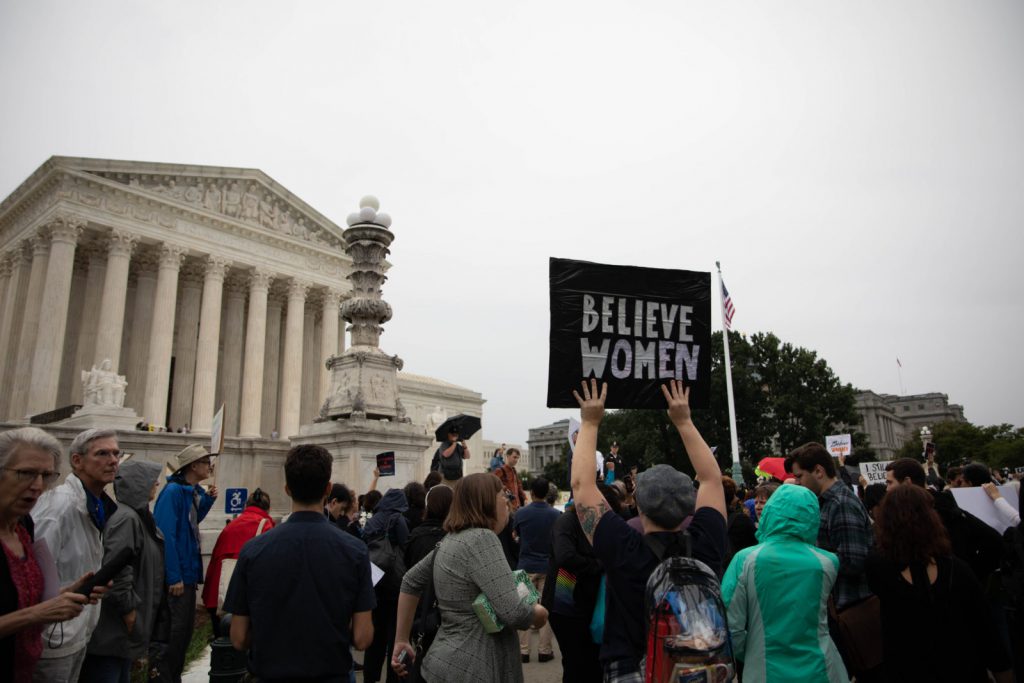
Published September 28, 2018
The story of the Kavanaugh affair had the elements of a black-and-white movie from long ago: “Advise & Consent” retold as “Rashomon,” a masterpiece of tabloid civics in the old Washington style. When the day was over, everyone was depressed about the country; some said this was a new low. And yet everyone had been richly entertained. Only Frank Capra, returned from the dead, could have done the day justice.
It would have to be filmed in black and white because the issues came mostly in black and white, and the contrast between the two antagonists told you things about the country’s differences, which are getting to be irreconcilable—a matter of alternate realities. The hearing brought us into the presence of F. Scott Fitzgerald’s idea that the test of a first-rate intelligence is the ability to hold two mutually contradictory ideas in the mind simultaneously without losing the ability to function.
The day of the great confrontation began with interminable preliminary rumblings by Judiciary Committee Chairman Chuck Grassley, who looks and sounds like the cranky grandfather in a Shirley Temple movie. While the senator honked and stipulated, the camera played for long moments upon the anxious countenance of Christine Blasey Ford.
Opposite her sat the murderer’s row of the committee. Many of their faces looked like those of character actors from the 1930s and ’40s. Sen. Sheldon Whitehouse (D., R.I.) had a white flop of hair in the Will Rogers style and eyes set alarmingly close together, as if to force his gaze to converge in a burning point of hayseed indignation.
Cut to Ms. Ford. You could follow the drama in her eyes, too, which moved behind her glasses like fish in an aquarium. Panic flickered and coalesced behind them. Millions studied her with a world of accumulated curiosity. Here at last the accuser had materialized, out of darkness and rumor, to tell her story. Panic and courage took turns in the close-up.
Mr. Grassley rumbled and millions suffered with Ms. Ford and wondered if she would be able to contain the panic or might bolt and flee this strange encounter between the contents of her deeply private “hippocampus”—the brain’s seat of memory and emotion, to which she referred more than once—and the nation’s highest and most historic public business. This would be a battle of two hippocampi—Brett’s and Christine’s.
The late Meg Greenfield, who ran the Washington Post’s editorial page long ago, used to say that the city of Washington is best understood as high school. She meant that the capital’s emotional age and social dynamics—its cliques and power plays—have the characteristics of adolescents between 14 and 18. The Ford-Kavanaugh business was a high-school reunion organized as a forensic did-he-do-it? She said. And he said. There was virtually no corroborating evidence for what she said.
Ms. Ford—51 now—recounted the evening of the party, voice quavering and steadying by turns. As you watched, you tried to reimagine her as the 15-year-old girl that she was then.
She climbed the stairs and at the top there was a bedroom and someone pushed her in and knocked her onto the bed—the bed was to the right of the door—and locked the door and groped and climbed on top. And there was another boy. The boys both laughed. She remembered that most—the boys stumbling drunk and laughing. And the one boy, Brett, covering her mouth when she tried to scream. Then the second boy tumbled on top and all fell to the floor (like the Marx Brothers, only it wasn’t funny) and she escaped.
It was all perfectly vivid and believable.
Rachel Mitchell, a professional interrogator brought in from Maricopa County, Ariz., to question Ms. Ford (to sit in for those Republican males, who were the wrong party and the wrong sex for present purposes) knew how to be soft and unalarming with a trauma victim. She replied to almost everything Ms. Ford said with a rising inflection of the therapeutic “OK.”
So Ms. Ford told her story, and was increasingly believed, and the morning ended.
The networks were riveted. Here was America in 2018, its angriest essences distilled into this characteristic but fairly strange drama enacting itself as middle-aged memories of high school. Here was Donald Trump’s nominee, Judge Kavanaugh (waiting offstage now), representing, possibly, the historic turn of the Supreme Court, a conservative who would guarantee the court’s direction for years, maybe up until the time when, as demographers projected, America would become a majority nonwhite country. The Supreme Court might be a sort of Alamo by the year 2040. A Justice Kavanaugh might be decisive in overturning Roe v. Wade. Not only that, he might reverse the drift of American law and social change from the time when Bob Dylan was paying acoustic guitar until the November night in 2016 when Hillary Clinton went into shock and Mr. Trump was elected president.
After Ms. Ford finished her testimony, the audience voted, informally, and the verdict was all but unanimous. “Kavanaugh is toast,” a friend emailed from London. On Fox News Channel, Chris Wallace said the same. Blood drained from faces in the West Wing.
The #MeToo movement sensed victory and vindication. You can imagine what Capra would have done with the moment: a fast montage of jubilant American women’s faces, energized.
But then came a ferocious turning of the plot, a great reversal—the sort of thing they teach in courses called How to Write a Brilliant Hollywood Script.
Judge Kavanaugh—previously all judicial temperament, all gravitas and family man—came hot into the committee room, now almost weeping, now insulting the Democrats (who recoiled a little), his distinctively Murland accent (that’s Maryland) harsh and a little reckless, his figurative middle finger extended toward the Democrats, whom he acknowledged now to be his bitter enemies—a menace to his home, his family.
And on the other plane, we were deeply back in adolescence, in underage beer drinking, football practice and swimming at the country club, back in the time of intense studies and intense friendships, of class rankings, all-nighters and idiotic, salacious entries in the yearbook.
The hearing became a sort of séance. The year 2018 set up a quivering, gauzy resonance with the year 1982. Middle age (with all its experience and achievement—Brett, from Georgetown Prep, at the height of the American judiciary now, and Christine, from Holton-Arms, a successful professional woman with a doctorate in psychology and, for all one knew, a rich private life) established communication with a prior world—with adolescent youth and its hopes, follies and terrors, and the mystery of an assault that did or did not happen.
The F. Scott Fitzgerald challenge came into play. Judge Kavanaugh—passionate, indignant, his voice breaking, eyes tearing—denied everything Ms. Ford had said, at least the parts involving himself. He, too, was entirely credible.
Perhaps “credible” meant “sympathetic.” Part of the sympathy accorded him now emerged from what we knew of his ordeal in recent days—the sudden onslaught of sexual allegations, three of them now, the second being quite incredible and the third being unprecedentedly scurrilous and filthy. Judge Kavanaugh gained sympathy from his evident suffering and that of his family. His wife sat behind him in the hearing room wearing an expression of unutterable disgust.
Ultimately, there developed an interesting dialogue between two phrases—“her truth” and “the truth.” New Jersey’s sea-green incorruptible, Sen. Cory Booker, made much of Ms. Ford’s having “told her truth.” He meant that if she told “her truth,” it was enough. Except it was not enough. The question was whether her truth was the truth—or whether his truth was the truth. It wasn’t possible that the two truths, his and hers, could square with one another.
The country will take its pick in November. In a way, American politics, even its idea of reality, has sifted down to a choice between Brett’s truth and Christine’s.
Mr. Morrow, a senior fellow at the Ethics and Public Policy Center, is a former essayist for Time.








